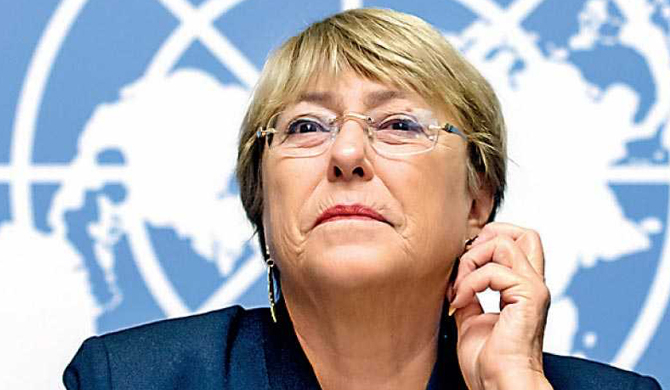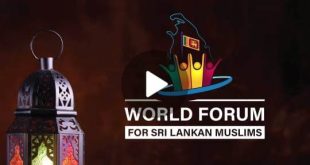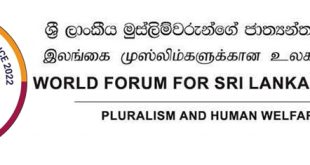The draft resolution on Sri Lanka at the UN Human Rights Council (UNHRC) has been revised ahead of a March 16 deadline and further revisions are likely after a third informal consultation next week between the co-sponsors of the resolution and concerned countries.
The revised draft remains a far cry from the recommendations set out by UN High Commissioner for Human Rights, Michelle Bachelet who urged member states of the UNHRC to consider targeted sanctions, asset freezes and travel bans against Sri Lankan perpetrators of war crimes and atrocities. However UNHRC observers said the draft appeared to have been strengthened slightly following two informal sessions on the language of the text last week.

The most notable change is the addition of the word “collect” to the operative paragraph in the resolution which calls on Bachelet’s office to preserve evidence for future processes to achieve justice for grave crimes.
The resolution now says member states have resolved to “strengthen the capacity of the Office of the High Commissioner to [collect], consolidate, analyse and preserve information and evidence and to develop possible strategies for future accountability processes for gross violations of human rights or serious violations of international humanitarian law, to advocate for victims and survivors, and to support relevant judicial proceedings in Member States with competent jurisdiction”.
The new draft includes the recognition of the importance of “preserving evidence relating to violations and abuses of “human rights and related crimes in Sri Lanka.”
Colombo Telegraph learns that “and related crimes” was an addition to the text suggested by the United States of America during last week’s informal discussions on the draft.
The revised draft resolution also calls on the Government to be “fully compliant” with human rights law in the application of its anti-terror legislation like the draconian Prevention of Terrorism Act.
UNHRC observers and analysts said that for the first time ever the resolution has also recognized the marginalized minority communities – Tamil and Muslims by name – and expresses the concern of member states about the government imposing restrictions on memorialization by the Tamil community in an operative paragraph of the draft text.
The Sri Lankan delegation behaved abominably at the informal discussions on the draft resolution last week sources who observed proceedings said. Sri Lanka was led by Ambassador C. A. Chandraprema, a known former paramilitary and death squad member also known as Thadi Priyantha. The Ambassador to Lanka attacked the Office of the High Commissioner for Human Rights in most undiplomatic terms Colombo Telegraph learned. Bringing up the ugly issue of money Chandraprema claimed that countries leading the effort against Sri Lanka by way of a resolution were also the main funders of Bachelet’s office. Observers said the Lankan Envoy openly insinuated that High Commissioner for Human Rights a widely respected former President of Chile and survivor of torture under Augusto Pinochet’s brutal dictatorship – was in the pay of the Western nations. Observers at the discussion said the onslaught seemed to shock other member states. In the same breath Chandraprema was also asking for massive changes to the draft resolution to portray President Nandasena Gotabaya Rajapaksa and his government in a better light. The Government of Sri Lanka was supported in its efforts by China, Russia, Pakistan, Iran and The Philippines.
Member states were anticipating similar antics from Chandraprema who revealed himself very badly last week at next week’s discussions too the sources said.
The sources added that despite the Sri Lankan Ambassador’s bluster all that appeared to have come from it was a slightly stronger resolution. Sri Lanka would have done better to engage more constructively in order to win some concessions on the draft text the sources said, adding that in fact the attitude of Ambassador Chandraprema was a revealing portrayal of the blunt force the Nandasena Government was willing to exercise even at a diplomatic forum. “It only proved that High Commissioner’s observations about the character of the new administration were probably correct even to skeptical members” the sources revealed.
Colombo Telegraph learns that although the US is not formally a member of the UNHRC Washington was taking an active role in negotiations on the resolution. The active engagement by the US would help the co-sponsors to win votes at the Council.
Full text of revised draft resolution:
46/… Promoting reconciliation, accountability and human rights in Sri Lanka
The Human Rights Council,
PP1 Guided by the purposes and principles of the Charter of the United Nations, reaffirming the Universal Declaration of Human Rights, and recalling the International Covenants on Human Rights and other relevant instruments,
PP2 Recalling Human Rights Council resolutions 19/2 of 22 March 2012, 22/1 of 21 March 2013, 25/1 of 27 March 2014, 30/1 of 1 October 2015, 34/1 of 23 March 2017 and 40/1 of 21 March 2019 on promoting reconciliation, accountability and human rights in Sri Lanka,
PP2 bis Recalling also that in Council resolution S11/1 the Council welcomed the resolve of Sri Lanka to begin a broader dialogue with all parties in order to seek a political settlement and to bring about lasting peace and development in Sri Lanka based on consensus among and respect for the rights of those from all ethnic and religious groups, and endorsed the joint communique of 26 May 2009 between the President of Sri Lanka and the United Nations Secretary-General, which inter alia, underlined the importance of a accountability process for addressing violations of international humanitarian law and human rights law,
PP3 Reaffirming its commitment to the sovereignty, independence, unity and territorial integrity of Sri Lanka,
PP4 Reaffirming also that it is the primary responsibility of each State to respect, human rights, and to ensure the full enjoyment of all human rights and fundamental freedoms of its entire population,
PP5 Deploring the acts of terrorism committed in Sri Lanka in April 2019 that led to a large number of injuries and deaths,
PP6 Acknowledging the holding of free and transparent democratic elections in November 2019 and August 2020,
PP7 Noting the enactment of the twentieth amendment to the Constitution of Sri Lanka while stressing the importance of democratic governance and independent oversight of key institutions, and encouraging the Government to respect local governance, including through the holding of elections for provincial councils, and to ensure that all provincial councils are able to operate effectively, in accordance with the thirteenth amendment to the Constitution of Sri Lanka,
PP8 Reaffirming that all individuals in Sri Lankan are entitled to the full enjoyment of their human rights without distinction of any kind such as religion, belief or ethnic origin, in a peaceful and unified land,
PP9 Acknowledging the progress made by the Government of Sri Lanka in rebuilding infrastructure, demining, land return, resettling internally displaced persons and improving livelihoods, and encouraging further efforts in these areas,
PP10 Welcoming the continued commitment of the Government of Sri Lanka to remain engaged with and to seek the assistance of the United Nations and its agencies, including human rights mandates and mechanisms, in capacity-building and technical assistance, and to achieve sustainable peace,
P10 bis Reaffirming its unequivocal condemnation of all acts, methods and practices of terrorism and violent extremism conducive to terrorism in all their forms and manifestations, wherever and by whomsoever committed, regardless of their motivation, and of the financial, material or political support of terrorism, as unjustifiable in accordance with applicable international law;
PP11 Reaffirming also that measures taken to combat terrorism must fully comply with States’ obligations under international law, in particular international human rights law, international refugee law and international humanitarian law, as applicable,
PP12Emphasizing the importance of a comprehensive approach to dealing with the past, incorporating judicial and non-judicial measures, to ensure accountability, to serve justice, to provide remedies to victims, to avoid the recurrence of violations of human rights and to promote healing and reconciliation,
PP13 Recognizing that mechanisms to redress past abuses and violations work best when they are independent, impartial and transparent, and use consultative and participatory methods that include the views of all relevant stakeholders, including, but not limited to, victims, women, youth, representatives of various religions, ethnicities and geographic locations, as well as people from marginalized groups, in accordance with the rule of law,
PP14 Recalling the responsibility of States to comply with their relevant obligations under human rights law and international humanitarian law, including where applicable to prosecute those responsible for gross violations of human rights law or serious violations of international humanitarian law,
PP15 Noting with appreciation the work of the Office of the United Nations High Commissioner for Human Rights towards the promotion and protection of human rights and truth, justice, reconciliation and accountability in Sri Lanka,
1. Welcomes the oral update presented by the United Nations High Commissioner for Human Rights to the Human Rights Council at its forty-third session and the report of Office of the United Nations High Commission for Human Rights presented to the Council at its forty-sixth session;
2. Also welcomes the engagement between the Government of Sri Lanka and the Office of the High Commissioner, and the Special Procedures of the Human Rights Council, urges the continuation of such engagement and dialogue, and calls upon Sri Lanka to implement the recommendations made by the Office and to give due consideration to the recommendations of the Special Procedures;
3. Acknowledges the progress made by the Office on Missing Persons and the Office for Reparations, and stresses the importance of maintaining support for these institutions, safeguarding their independent and effective functioning, providing both offices with sufficient resources and technical means to effectively fulfil their mandates, allowing them to proceed with interim relief measures for affected vulnerable families, with a gender focus, and resolving the many cases of enforced disappearances so that the families of disappeared persons can know their fate and whereabouts;
4. Stresses the importance of a comprehensive accountability process for all violations and abuses of human rights committed in Sri Lanka by all parties, including those abuses by the Liberation Tigers of Tamil Eelam, as highlighted in the comprehensive report of the Office of the High Commissioner on Sri Lanka;
5. Notes the persistent lack of accountability of domestic mechanisms, and that the domestic commission of inquiry announced on 22 January 2021 lacks independence and that its mandate is to review reports of previous Commissions and Committees and does not include a mandate to pursue accountability for past gross violations of human rights, or for serious violations of international humanitarian law;
6. Recognizes the importance of preserving and analysing evidence relating to violations and abuses of human rights and related crimes in Sri Lanka with a view to advancing accountability, and decides to strengthen the capacity of the Office of the High Commissioner to [collect], consolidate, analyse and preserve information and evidence and to develop possible strategies for future accountability processes for gross violations of human rights or serious violations of international humanitarian law, to advocate for victims and survivors, and to support relevant judicial proceedings in Member States with competent jurisdiction;
7. Expresses serious concern at the trends emerging over the past year, which represent a clear early warning sign of a deteriorating situation of human rights in Sri Lanka, including the accelerating militarization of civilian government functions; the erosion of the independence of the judiciary and key institutions responsible for the promotion and protection of human rights; ongoing impunity and political obstruction of accountability for crimes and human rights violations in “emblematic cases”; policies that adversely affect the right to freedom of religion or belief; increased marginalization of Tamil and Muslim minorities, surveillance and intimidation of civil society, restrictions on media freedom, and shrinking democratic space; restrictions on public memorialization of victims of war including the destruction of a memorial; arbitrary detentions; alleged torture and other cruel, inhuman degrading treatment or punishment, and sexual and gender-based violence,; and that these trends threaten to reverse the limited but important gains made in recent years, and risk the recurrence of policies and practices that gave rise to the grave violations of the past;
8. Expresses further concern that the coronavirus disease (COVID-19) pandemic has had an impact on freedom of religion or belief and exacerbated the prevailing marginalization of and discrimination against the Muslim community, and that cremations for all those deceased from COVID-19 has prevented Muslims and members of other religions from practicing their own burial religious rites, and has disproportionately affected religious minorities and exacerbated distress and tensions;
9. Calls upon the Government of Sri Lanka to ensure the prompt, thorough and impartial investigation and, if warranted, prosecution of all allegations of gross human rights violations and serious violations of international humanitarian law, including for long-standing emblematic cases;
10. Also calls upon the Government of Sri Lanka to ensure the effective and independent functioning of the Human Rights Commission of Sri Lanka, the Office on Missing Persons and the Office for Reparations to deliver their respective mandates as established;
11. Further calls upon the Government of Sri Lanka, having due regard for the rule of law and human rights to protect civil society actors including human rights defenders to investigate any attacks and to ensure a safe and enabling environment in which civil society can operate free from hindrance, surveillance and insecurity and threat of reprisals;
12. Requests the Government of Sri Lanka to review the Prevention of Terrorism Act, and to ensure that any legislation on combating terrorism complies fully with the State’s international human rights and humanitarian law obligations;
13. Urges the Government of Sri Lanka to foster religious freedom and pluralism by promoting the ability of all religious communities to manifest their religion, and to contribute openly and on an equal footing to society;
14. Encourages the Government of Sri Lanka to continue to cooperate with the special procedures of the Human Rights Council, including by responding formally to outstanding requests from them;
15. Encourages the Office of the High Commissioner and relevant special procedure mandate holders to provide, in consultation with and with the concurrence of the Government of Sri Lanka, advice and technical assistance on implementing the above-mentioned steps;
16. Requests the Office of the High Commissioner to enhance its monitoring and reporting on the situation of human rights in Sri Lanka, including on progress in reconciliation and accountability, and to present a written update to the Human Rights Council at its forty-ninth session, and a comprehensive report that includes further options for advancing accountability, at its fifty-first session, each to be discussed in the context of an interactive dialogue.
Disclaimer :
Views expressed by writers in this section are their own and do not necessarily reflect World Forum for Sri Lankan Muslims (wfslm.org) point-of-view.
 World Forum for Sri Lankan Muslims Sri Lanka Muslims Forum
World Forum for Sri Lankan Muslims Sri Lanka Muslims Forum


